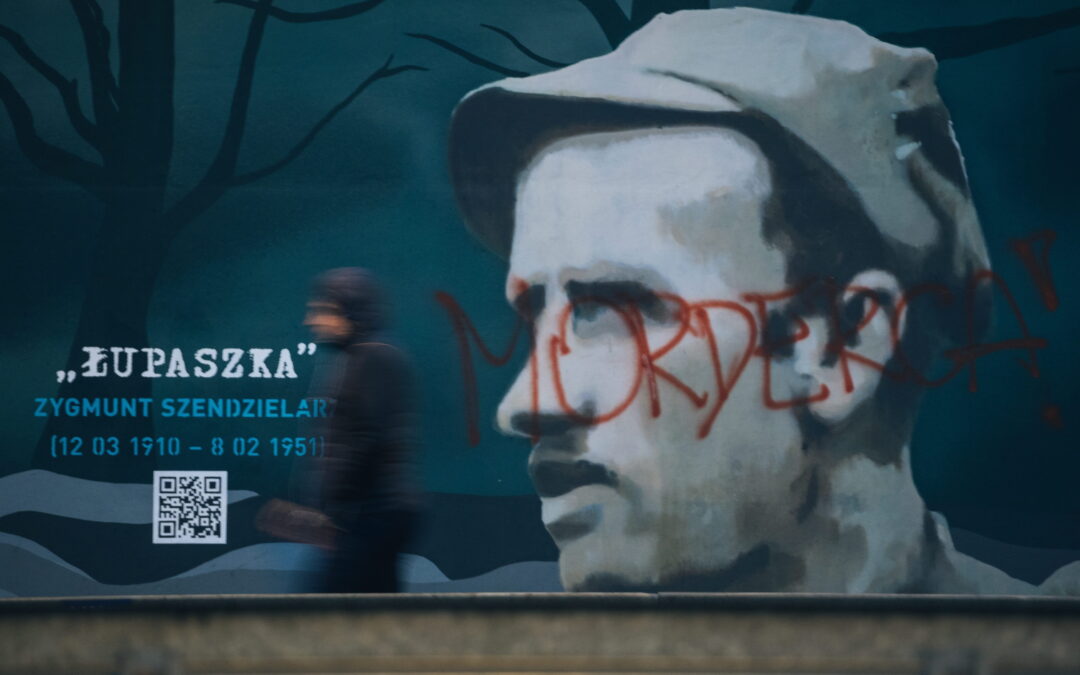Opposition MPs walked out of parliament yesterday as the chamber commemorated an underground officer who fought against Nazi-German occupation and the imposition of communism in Poland, but has also been accused of war crimes against civilians.
Their actions were criticised by members of the national-conservative ruling party and the far right, who see the figure in question – Zygmunt Szendzielarz, widely known by his nom de guerre “Łupaszko” – as a national hero.
Yesterday, 8 February, was the anniversary of Szendzielarz’s death in 1951, when he was executed by the postwar communist authorities at the age of 40. Previously, he had fought in the underground resistance against Nazi German occupation during the Second World War, and then against the Soviet-backed communists afterwards.
In his honour, parliament held a minute’s silence and a short prayer at the behest of Elżbieta Witek, the speaker of the house. Some MPs then shouted “honour and glory to the heroes” and “down with communism”, reports Niezależna.
However, a number of deputies from the largest opposition group, the centrist Civic Coalition (KO), decided instead to walk out of the chamber. MPs from The Left (Lewica), the second-largest opposition group, remained in the room but refused to participate in the commemoration, remaining seated instead.
Sejm upamiętnił majora Zygmunta Szendzielarza ps. "Łupaszka" w 71 rocznicę jego zamordowania przez komunistycznych oprawców. Lewica siedzi. Platforma wychodzi z sali. Taki obraz wolnej Polski. pic.twitter.com/mo1o1hYgJY
— Tomasz Grabarczyk (@grabarczyktomek) February 8, 2022
Their behaviour was condemned by right-wing figures. “Shame!!!” tweeted Adam Andruszkiewicz, an MP from the caucus of the ruling Law and Justice (PiS) party and a secretary of state in the prime minister’s office.
“It is sad that, 30 years after [the end of communism], a large part of the Polish parliament are still people who express opposition to Polish heroes in such a shameful way,” said Tomasz Grabaczyk, press secretary for the far-right Confederation (Konfederacja) party.
An MP from his party, Michał Urbaniak, accused The Left and Civic Coalition of being “continuers of the tradition of the murderers of the Cursed Soldiers”, the latter term (żołnierze wyklęci in Polish) being the name given to anti-communist partisans.
The prime minister himself, Mateusz Morawiecki, did not criticise opposition MPs directly, but noted that “not everyone was able to appreciate the sacrifice [Szendzielarz] made for freedom and democracy”. He referred to Szendzielarz as a “hero”.
Asked why she had been among those to walk out of the room, Katarzyna Lubnauer of KO told state broadcaster TVP that Szendzielarz was a “bandit”.
Magdalena Biejat of The Left condemned the speaker of parliament, Elżbieta Witek, for her “scandalous decision…to honour a criminal”. Her party colleague Adrian Zandberg said that Szendzielarz’s “subordinates murdered dozens of women and children”.
Zandberg was referring to an episode in 1944 when the unit Szendzielarz commanded – the Home Army Fifth Wilno Brigade – attacked the village of Dubinki (now Dubingiai in Lithuania) as a reprisal for the massacre of ethnic Polish civilians by a Lithuanian battalion that operated under the authority of the Nazi-German occupier.
Skandaliczna decyzja Marszałek @elzbietawitek, która postanowiła uczcić zbrodniarza bez konsultacji z prezydium Sejmu. https://t.co/dmjwdJVSbE
— Magda Biejat (@MagdaBiejat) February 8, 2022
Szendzielarz’s unit killed dozens of Lithuanian civilians in Dubinki and other settlements, 75% of them women and children, according to research by Paweł Rokicki, a historian from Poland’s state-run Institute of National Remembrance (IPN). There is “no doubt that it was a war crime “, wrote Rokicki in 2015.
However, since PiS returned to power in that year, the IPN has changed its approach to Szendzielarz. In recent years, it has hung a large banner of him to “honour the memory of the soldiers of the anti-communist underground”.
In 2007, president Lech Kaczyński – a founder of PiS – posthumously awarded Szendzielarz the Grand Cross of the Order of Polonia Restituta. In 2016, the current president, Andrzej Duda, participated in a funeral ceremony during which Szendzielarz’s recovered remains were reburied at Powązki Military Cemetery in Warsaw.
#Olsztyn #historia #zołnierzewykleci https://t.co/PRdpT5NG1g
— Olsztyn.com.pl (@olsztyncompl) March 2, 2021
On the anniversary of Szendzielarz’s death last year, Duda laid a wreath at his tomb. He was criticised for doing so by Anna-Maria Żukowska, an MP from The Left, who accused him of “venerating a murderer of women and children”.
Her party has also expressed opposition to the National Day of Remembrance of the Cursed Soldiers, honouring underground partisans like Szendzielarz who resisted the introduction of communism in Poland after World War Two.
They argue that jointly honouring all such figures – who include genuine heroes like Witold Pilecki and General Emil August Fieldorf but also a minority accused of war crimes – is inappropriate.
The @WorldJewishCong recounts the story of Witold Pilecki, the Polish underground officer who deliberately had himself imprisoned at Auschwitz to gather intel on the camp and organise resistance within it, then after the war was executed by the communists pic.twitter.com/o14zkfaT43
— Notes from Poland 🇵🇱 (@notesfrompoland) January 13, 2019

Daniel Tilles is editor-in-chief of Notes from Poland. He has written on Polish affairs for a wide range of publications, including Foreign Policy, POLITICO Europe, EUobserver and Dziennik Gazeta Prawna.




















